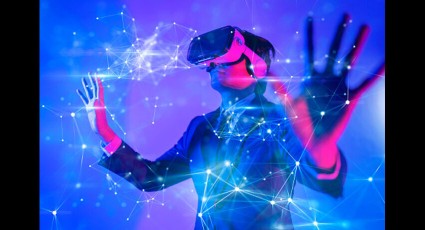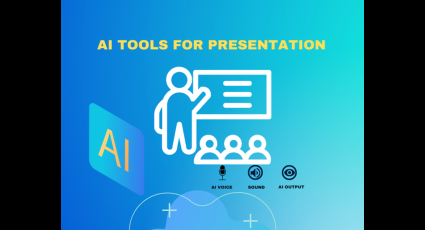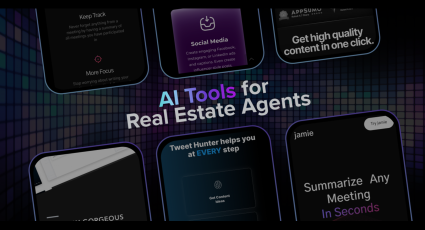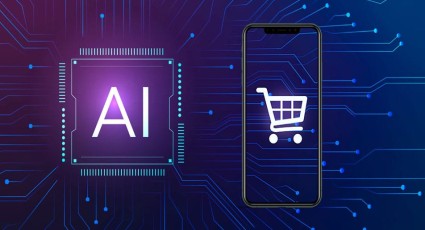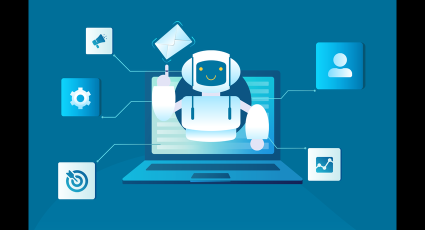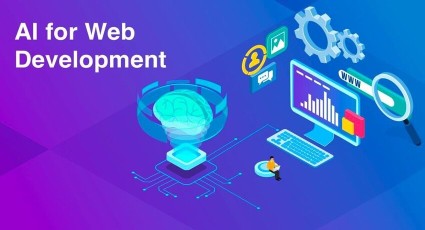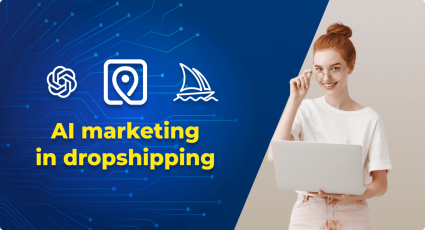Blog Details
AI in Digital Marketing: How it Works?

Artificial intelligence (AI) is a powerful tool that helps businesses in digital marketing. It can change how brands interact with their customers. AI isn't just a trendy word; it's a significant change that is already starting to affect everything online. AI helps predict trends, create personalized content, and automate repetitive tasks, making it a valuable tool for modern marketers.
For business owners and marketers, understanding AI is essential to stay competitive. However, with so many AI tools available, it can be overwhelming. But don't worry; we're here to explain AI in digital marketing, from the basics to the latest advancements, to help you succeed with data-driven strategies.
So, what exactly is AI in Digital Marketing?
AI in digital marketing involves using advanced technology to analyze data and make intelligent marketing decisions without direct human involvement. AI helps machines learn from data, find patterns, and make predictions and decisions based on that analysis.
How does AI work in marketing?
AI uses machine learning (ML), natural language processing (NLP), deep learning, and cognitive computing to improve marketing processes. These technologies allow AI systems to quickly process large amounts of data, identify trends and preferences, and use that information to improve marketing strategies.
Understanding Key AI Concepts
Machine Learning (ML):
ML is a part of AI that focuses on creating systems that can learn from data and make decisions. Marketers use ML to predict the best way to spend money on ads, personalize customer experiences, and group customers based on their behavior.
Natural Language Processing (NLP):
NLP is how machines understand and respond to human language. This is important for AI chatbots, as it analyzes feelings in text and creates content.
Deep Learning:
Deep learning is a type of ML that uses complex networks to do tasks like recognizing speech or images better than humans can.
Cognitive Computing:
Cognitive computing is like how our brains work. It helps AI systems process and learn from messy data to make better decisions. It's used in AI systems that need to understand unclear data or learn from different sources.
Why Use AI in Marketing?
In the cut-throat world of digital marketing, where every click and share is a matter of life or death, AI contains several advantages that can help brands succeed.
Data-Driven Decision Making:
AI can process large volumes of data and provide the basis for your decisions, which will not be only based on guesswork.
Personalization at Scale:
AI allows you to build custom experiences for each audience member, which can lead to higher engagement and conversion rates. This would be a great way to reach the right person at the right time with the right message.
Streamlined Ad Buying:
With AI, you can perform the process of ad buying automatically, which will free you from the need to spend time and money. With this, your ads will only be shown to the right audience at the right time.
Efficient Customer Support:
AI-powered chatbots can provide customer service 24 hours daily by answering simple questions or assisting with purchases. They provide prompt and steady replies that are well-received by customers.
Content Optimization:
AI tools can assist you with the process of deciding what kind of content will work best with your audience, whether it is the headline or the image. This is a great way to attract and retain customers.
AI Tools for Digital Marketing: Best Ones
The AI tools' landscape is vast, and they have solutions for every digital marketing challenge. Here are some of the best ai tools for digital marketing in class:
Marketing Automation
HubSpot
The AI-based marketing automation platform of HubSpot enables you to develop, manage, and measure personalized customer journeys, which eases the burden of manual marketing tasks.
Marketo
Marketo Engage offers standard marketing automation and uses AI to predict content and enhance the personalization and scoring of leads.
Pardot
With AI, Pardot offers B2B marketers a way of finding and nurturing potential leads using data-driven insights and decision-making.
Content Generation and Optimization
Clear scope
Clearscope applies AI to assist your content in search engines and user performance optimization. It does so by ensuring that your content is relevant and high-performing.
Grammarly
Grammarly's AI-based writing assistant is an intelligent tool that ensures your content is explicit, engaging, and delivered with the right tone.
Persado
Persado automates the process of generating language for marketing communication optimized for effect. It applies data science and machine learning to predict the reaction to each message element.
CRM and Customer Insights
Salesforce Einstein
Einstein is Salesforce's AI layer that applies advanced analytics and predictive model modelling CRM, which allows marketers to understand and predict customers' behaviour preferences.
Datorama
Datorama is a marketing intelligence platform that AI powers to collect and correlate data from multiple sources. Hence, marketers have a single source of truth to guide their strategies.
Adobe Sensei
Sensei is a technology of Adobe, an AI and machine learning tool that provides the company's design, marketing, and advertising platforms with the ability to sift through data, identify trends and offer predictive analytics.
Social Media Management
Hootsuite
Hootsuite's AI tools for social media enable marketers to plan posts, select the content and get their social media performance insights faster.
Sprinklr
Sprinklr is a platform that implements AI to assist marketers in understanding their audience, improving social media campaigns, and giving better customer support across all platforms.
Buffer
Buffer utilizes AI to provide content suggestions, scheduling, and deep insights into your social media presence.
AI in Digital Marketing: How to Use AI Tools
Although the technology may seem overwhelming initially, AI integration into marketing is a gradual process that can bring you many benefits from the investment.
Step 1: Define Your Objectives
Firstly, you should determine which marketing activities would benefit from using AI. One way or the other, whether it is about understanding customer behaviour, improving ad performance or simplifying customer service, knowing your objectives is the critical factor.
Step 2: Pick the Appropriate Tool
Research AI tools that will help you reach your goals and choose the most suitable ones for the job. Consider the aspects of your existing tech stack, such as compatibility, ease of integration, price, and relevant functionality.
Step 3: Data Accuracy
Make sure you have the clean and complete data. AI is as good as the data it eats; therefore, data accuracy is crucial.
Step 4: Develop Your Employees
Bringing AI into our culture is a significant change. Ensure your team is well-versed in the new tools and work methods they facilitate.
Pros and Cons of AI in Digital Marketing
The AI marketing strategy, though, has its pros and cons. Here's a look at the pros and cons:
Pros of AI in Digital Marketing
Increased Efficiency
AI will automate a variety of tasks, which will free up time and resources for other purposeful initiatives.
Enhanced Personalization
The potential of having the capacity to deliver personalized content to the masses can have a significant impact on customer satisfaction and sales.
Real-Time Analytics
AI can provide marketers with real-time data that allows them to make immediate decisions based on sound knowledge and helps them stay on track with their campaigns.
Cost Savings
AI can achieve this by taking over tasks that would otherwise require human labour, thus reducing operational costs.
Cons of AI in Digital Marketing
High Initial Cost
AI technology is costly to adopt. It is an investment that requires a significant upfront expenditure on the tools and the training to use them properly.
Data Privacy Concerns
AI in data collection and analysis may give rise to privacy issues, primarily related to GDPR.
Over-Reliance on Technology
Being dependent on AI may lead to a lack of creativity and, eventually, the loss of the human aspect of marketing.
The Best AI Uses in Digital Marketing
AI has been the major player in different business marketing campaigns and has been among the most successful and innovative.
Dynamic Pricing
For instance, retailers like Amazon use AI to adapt prices to demand, competitors' prices, and other market conditions.
Chatbots and Customer Service
Brands such as Sephora have deployed chatbots to advise on personalized product recommendations, makeup tutorials, and the option of trying products through augmented reality.
Content Personalization
Netflix's recommendation engine is the best illustration of AI's personalization of content, which makes it more engaging and customers more devoted.
Predictive Search
Google employs AI in its auto-complete function and its search and ad ranking systems to ensure that users are able to find what they are most likely to be searching for.
AI in Digital Marketing: the Future
AI's future in digital marketing is limitless, and it is set to introduce multiple innovations and disruptions ahead.
Prediction
AI's predictive capabilities will improve, allowing marketers to forecast customer requirements and behaviours with a degree of accuracy never before experienced.
Voice Search Optimization
The emergence of voice-activated devices will make voice search optimization a significant area of concentration for AI-driven marketing tactics.
More Human-like Interactions
AI chatbots and virtual assistants will become more elaborate in the future, and their interactions will be almost impossible to differentiate from human-to-human conversations.
AI integration in video and visual content
AI will be involved in generating, distributing and optimizing video and visual content, which in turn will provide personalized experiences to audiences.
AI-Generated Content: The Breakthrough
Natural language generation will be the key to AI's ability to generate written content that is not distinguishable from human-generated content but accurate and timely, especially in news-related texts.
Conclusion
AI's role in digital marketing is not a temporary trend; it's a fundamental change in how companies analyze and interact with their customers. Marketers can use AI to access new levels of efficiency, personalization and innovation, which were once only science fiction.
Yet, this new age is not free from its challenges. Overcoming the ethical dilemmas of data usage, making sure the technology is for the benefit of humanity and not the other way around, and preparing your team for a future where people and machines work together are all part of the integration process.
The road is on the horizon; AI in digital marketing is here to change how we connect with audiences and the art and science of marketing. Now is the time to begin your AI journey, experiment, learn, and transform your marketing into a strategic machine fully capable of harnessing the power of artificial intelligence. AI is your companion now, and you can be sure the future will be full of unique possibilities.

